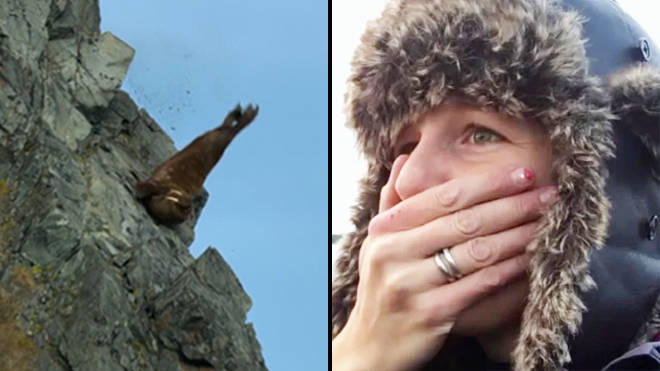Title: The Walrus Scene from Netflix's "Our Planet" Leaves Viewers Traumatized
Introduction
Netflix's "Our Planet" is a groundbreaking documentary series that has taken audiences on a breathtaking journey to explore the beauty and wonders of the natural world. While the show has garnered widespread praise for its stunning cinematography and informative storytelling, it has also become the source of a significant controversy due to one particular scene featuring walruses. In this 1500-word article, we will delve into the infamous walrus scene from "Our Planet," exploring why it left viewers traumatized and the broader implications it has on our understanding of climate change and its impact on wildlife.
The Scene in Question
In the second episode of "Our Planet," viewers are introduced to a heart-wrenching scene set on a remote island in the Russian Arctic. The scene captures the lives of a large colony of walruses as they struggle to find a place to rest on the island's rocky cliffs. The visual narrative depicts the walruses scaling heights far from their natural habitats, leading to disastrous consequences.
What Unfolded
The scene unfolds as thousands of walruses desperately climb the steep cliffs, reaching dangerous heights to escape the overcrowded waters below. Tragically, these massive animals are not built for such endeavors, and their bodies are ill-equipped to handle the challenges of climbing steep terrain. The result is heart-wrenching as walruses are shown falling from significant heights, leading to injuries and death.
The Emotional Impact
The walrus scene from "Our Planet" struck a deep emotional chord with viewers around the world. Many reported feeling traumatized and saddened by the images they witnessed. The disturbing scenes of walruses tumbling from cliffs are profoundly distressing, as they depict the suffering of these magnificent creatures brought about by the consequences of climate change.
Why Viewers Were Traumatized
The trauma experienced by viewers can be attributed to several factors:
1. Emotional Connection: Documentary filmmaking often relies on establishing a connection between the audience and the subjects. In "Our Planet," viewers become emotionally invested in the lives of the walruses. Witnessing their suffering and death becomes deeply disturbing.
2. Helplessness: The walrus scene also highlights the helplessness of these animals in the face of environmental challenges. The walruses are merely trying to adapt to their changing habitat, and the tragic consequences are beyond their control.
3. Climate Change Reality: This scene serves as a stark reminder of the very real and devastating impacts of climate change. The walrus colony's desperate actions are a direct result of the shrinking Arctic sea ice, which forces them to come ashore. The consequences of this environmental crisis are both horrifying and real.
4. Ethical Dilemma: "Our Planet" forces viewers to confront an ethical dilemma. The decision to include such distressing footage is a conscious choice to raise awareness about the plight of wildlife and the urgency of addressing climate change. This dilemma adds to the emotional turmoil experienced by the audience.
Implications for Wildlife and Climate Change Awareness
The traumatizing walrus scene from "Our Planet" brings several important implications to the forefront:
1. Climate Change Reality: The scene underscores the pressing issue of climate change and its direct impact on wildlife. As the Arctic ice continues to recede due to rising global temperatures, species like walruses are forced into extreme and dangerous situations. "Our Planet" serves as a call to action, demanding attention to the ongoing environmental crisis.
2. Conservation Efforts: The emotional impact of this scene may lead to increased support for conservation efforts. Viewers who were traumatized may be more inclined to donate to organizations working to protect the Arctic and its wildlife.
3. Ethical Dilemmas in Filmmaking: The inclusion of distressing scenes in documentaries like "Our Planet" raises questions about the ethics of nature filmmaking. While these scenes are challenging to watch, they serve as a powerful tool for raising awareness and sparking conversations about the environment.
4. The Power of Visual Storytelling: The walrus scene's impact demonstrates the incredible power of visual storytelling. It evokes empathy and concern, transcending traditional educational approaches to raise awareness about climate change and its effects on ecosystems and species.
Conclusion
The walrus scene from Netflix's "Our Planet" has left viewers traumatized, and for a good reason. It offers a visceral and emotionally charged depiction of the dire consequences of climate change on wildlife. While it is undeniably difficult to watch, it serves as a vital wake-up call, demanding our attention to the environmental challenges our planet faces. Through its emotional impact, this scene has the potential to inspire action, increase support for conservation efforts, and prompt ethical discussions about nature filmmaking. It reminds us that the stories of the natural world are not always easy to witness but are crucial for fostering a deeper understanding of our planet's fragile ecosystems.

